42 piano action diagram
Hand Making a Grand Piano Action Model: Hi, I made a Grand piano action model for the "Make it Real Challenge" and "Woodworking challenge". I just bought a spanking new 7'6" Shigeru Kawai SK7 and thought that a nice feature piece like this would be awesome to sho… The piano is a musical string and percussion instrument utilized in classical and contemporary music genres. Invented around the year 1700, the piano draws inspiration from the harpsichord and the clavichord. A piano has a minimum of 88 keys; 52 white or natural keys and 36 black or accidental keys.
old freak action parts no longer need send an old piano to the city dump. Look at the parts we offer, and if your part is missing, SEND MAIL and we will get a quote for you. CLICK HERE: To study the diagram of the Grand Action or Grand Damper Action. CLICK HERE: For Upright Piano Parts
Piano action diagram
The most notable part, and what makes a piano a piano, is the keyboard. This is the area of the piano where most of the interaction between the pianist and the instrument occurs. Acoustic pianos consist of 88 black and white keys in total. 36 of these keys are visibly shorter than the others, are black, and are often referred to as "sharps ... action to support the hammer By around 1870, within a century and a half of the pi-ano's development, improvements in these areas had made the piano suitable for ever-larger theaters and music halls.111 No longer just a chamber instrument, the piano became capable of carrying a solo part against an orches-tra of over a hundred musicians. Another component that is common to all Standard actions is the five-point air motor with the sliding valves pointing forward. The Standard action was by far the most common player action ever produced. Nearly 50% of all player piano makers installed the Standard action at some time during their production run.
Piano action diagram. As its name suggest, the Grand Feel Compact (GF-C) action has been designed to reproduce the authentic touch weight characteristics of the industry-leading Grand Feel keyboard actions, within a smaller form factor. The new action retains the long wooden key sticks used for all 88 black and white keys, and the familiar 'seesaw' mechanism employed by acoustic grand piano actions for centuries. Britannica Pianoforte Schroeter Action Model.png 784 × 464; 14 KB. Britannica Pianoforte Stein Action.png 928 × 227; 7 KB. Britannica Pianoforte Steinway Grand Piano Action.png 926 × 488; 20 KB. Britannica Pianoforte Wornum Upright Action.png 372 × 1,030; 14 KB. Britannica Pianoforte Zumpe Square Piano Action.png 929 × 333; 11 KB. Here’s why I think of piano chord inversions like a secret weapon: once you become fluent with inversions on the piano, you have lots of options for playing the same chord . . . all over the piano! For example, if you’re playing a C chord, instead of playing it only in root position, you can play it in first inversion, then back to root ... Charles Kohler began the Auto-Pneumatic Action Company in 1900 for making a reliable player action for the piano. Danquard helped Kohler and obatained a patent for the "flexible finger." This means the wippen of the action is attached to the player mechanism. John Campbell was a factory organizer and business man.
The defining characteristic of the spinet was its drop action (sometimes called indirect blow action). In this device, the keys did not engage the action directly; rather they pulled upward on rods called "stickers," which in turn pulled upward on levers located below the level of the keyboard, which in turn engaged the action . See part 16 in the diagram. If the Jack is about 3 inches tall, you have a Full Sized Upright. See part 16 in the diagram. What about consoles and studio uprights? The same rule applies. Choose the link below that applies to your piano. FULL SIZED UPRIGHT PIANO ACTION PARTS. SPINET UPRIGHT PIANO ACTION PARTS Renner USA Administration Office P.O. Box 3440 Carefree, Arizona 85377. Renner USA Warehouse and Technical Shop 7755 E Redfield Road Suite 200 Scottsdale, AZ 85260 21. Catcher buckskin 22. Backcheck felt 23. Backcheck 24. Damper lift rod 25. Hammer butt flange 26. Main action rail 27. Jack 28. Let-off regulating screw
To read another description of this action - Click Here To see a graphic of the early action - Click Here. On January 13, 2019, I encountered an early Amphion system (circa 1906-1907) that is not referenced in any of the literature that was produced by Amphion. This system was found in a Troup Bros. player piano with a Seaverns piano action. Study the UPRIGHT PIANO ACTION. Now, imagine eliminating the "Sticker" completely. and imagine the capstan touching the bottom of the "Wippen" right where the top of the "Sticker" attaches to the "Whippen." That is the only real difference in "Consoles." On some Yamahas and some old uprights, there is a wooden capstan on a rather ... A demonstration on the different parts in a grand piano action. We also have a video showing the different parts of a vertical piano action: http://www.howa... The pneumatic is connected to the piano action by a simple linkage. The diagram below shows the whole assembly, firstly in resting and then playing positions. When a roll perforation passes over a tracker bar hole, air is admitted, causing the pouch to move upwards under suction inside the chamber. ...
Upright Piano Action diagram courtesy of Infovisuals. As shown in the above figure, an upright piano action can be divided into six major components — key, wippen, jack, back check, hammer butt ...
The piano action mechanism (also known as the key action mechanism or simply the action) of a piano or other musical keyboard is the mechanical assembly which translates the depression of the keys into rapid motion of a hammer, which creates sound by striking the strings. Action can refer to that of a piano or other musical keyboards, including the electronic or digital stage piano and ...
The mechanical action structure of the upright piano was invented in London, England in 1826 by Robert Wornum, and upright models became the most popular model. Upright pianos took less space than a grand piano, and as such they were a better size for use in private homes for domestic music-making and practice.
The mechanism of the piano that causes hammers to strike the strings when a key is pressed is called the "action." When one speaks of the history of the piano action, mentioning the repetition mechanism (double escapement) invented by Sébastien Érard of France is a must.
Piano Benches, Covers, Dollies, Music Cabinets, Parts & Tools World's #1 Supplier - 23rd Yr Online. 7500 Piano Items for Home & Business. Toll Free 1-800-791-7144 (EST)
Here is a piano with the action in back behind the sound board. It is an Erbe from Germany. The tuner will need a chiropractor after tuning this one. You can go from here. directly to an area discussing your part in quesion. OR. Go the the catalog page offering the part. you find by its name in the diagram,
European Commission - Policies, information and services. Select your language. български español čeština dansk Deutsch eesti ελληνικά English (Current language) français Gaeilge hrvatski italiano
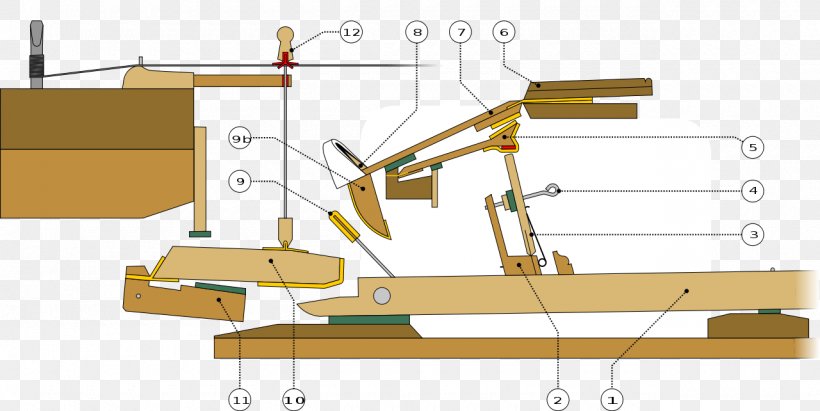
Rhodes Piano Action Square Piano John Broadwood Sons Png 1280x642px Rhodes Piano Action Bartolomeo Cristofori
This is the Yamaha Corporation [Musical Instrument Guide] website. This article contains information about the Piano [The Structure of the Piano:Let's Learn the Names of Parts]
German piano builder Udo Kamm in collaboration with FEURICH developed an add-on to the piano action that significantly improves the piano's playing characteristics. Scientific tests at the Department of Music Acoustics at the University of Music and Performing Arts in Vienna confirmed the effectiveness of the High Speed KAMM Action: The ...
The action is the heart of the piano. Its purpose is to transmit the actions of the pianist to the hammers. The modern grand double escapement action is what allows the grand piano to quickly repeat a note without fully releasing the key. Many piano manufacturers make their own unique modifications to the action.
The outside of the Venn Diagram is 10, and the total of the entire diagram must equal 35. Therefore the two circles of the Venn Diagram including just chocolate, just vanilla and the intersection must equal 25, with the just chocolate plus intersection side equalling 15 and the just vanilla plus intersection side equalling 13. We know:
Cristofori’s piano was largely unknown until 1711 when an Italian writer, Scipione Maffei wrote about it. His article was a very enthusiastic one and included a diagram of the mechanism. Subsequently, many piano builders started their work because of what they read in that article.
Parts of a Grand Piano. Action Frame: Tightly mounted to the piano to keep the playing mechanism securely mounted. Dampers: Triangular felts used to stop the vibration of the strings. Bass Strings: Steel core winding used to slow down the vibration of wire. Cover: Folds down to cover the keys when not in use. Bass Bridge: Connects the sound of the vibrating string into the body of the bass.
1. String 2. Damper head 3. Damper felt 4. Damper guide rail 5. Damper wire 6. Hammer 7. Hammer shank 8. Drop screw 9. Hammer flange 10. Main action rail
A piano action is an amazing mechanism with an enormous responsibility. Its crucial task is to transfer musical energy seamlessly from the pianist's fingers to the piano strings, allowing the player to accurately and expressively communicate the subtle (and not so subtle) musical nuances of the heart and mind through the instrument and into the listener's ears.
There are a lot of things that happen in a piano action between the time the key is pressed until the time the string plays a note. This video goes through...
In his left hand is a piece of paper, believed to contain a diagram of Cristofori's piano action. The portrait was destroyed in the Second World War, and only photographs of it remain. Cristofori continued to make pianos until near the end of his life, continually making improvements in his invention.
Another component that is common to all Standard actions is the five-point air motor with the sliding valves pointing forward. The Standard action was by far the most common player action ever produced. Nearly 50% of all player piano makers installed the Standard action at some time during their production run.
action to support the hammer By around 1870, within a century and a half of the pi-ano's development, improvements in these areas had made the piano suitable for ever-larger theaters and music halls.111 No longer just a chamber instrument, the piano became capable of carrying a solo part against an orches-tra of over a hundred musicians.
The most notable part, and what makes a piano a piano, is the keyboard. This is the area of the piano where most of the interaction between the pianist and the instrument occurs. Acoustic pianos consist of 88 black and white keys in total. 36 of these keys are visibly shorter than the others, are black, and are often referred to as "sharps ...
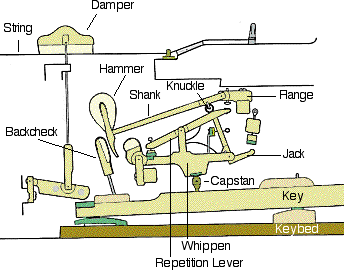


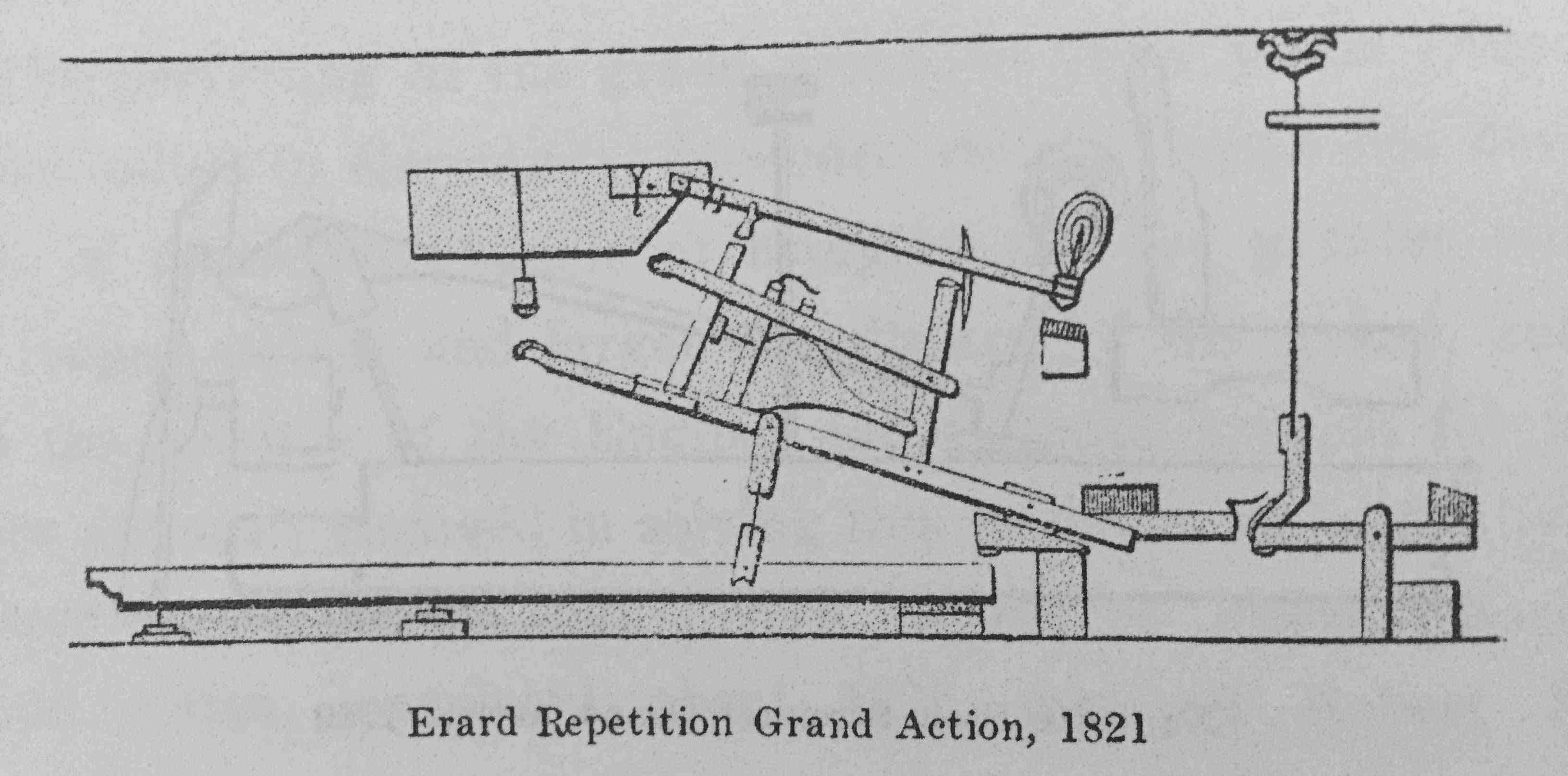
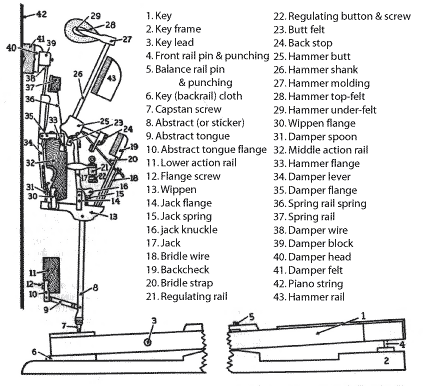

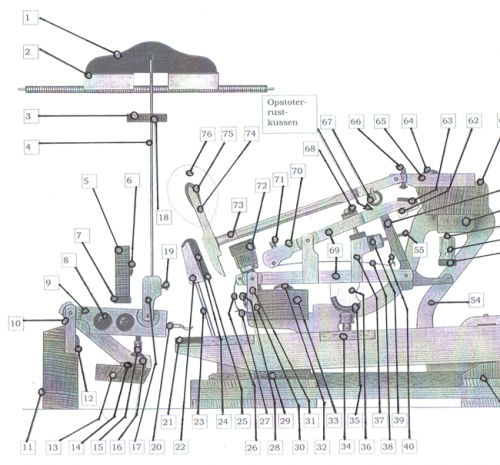




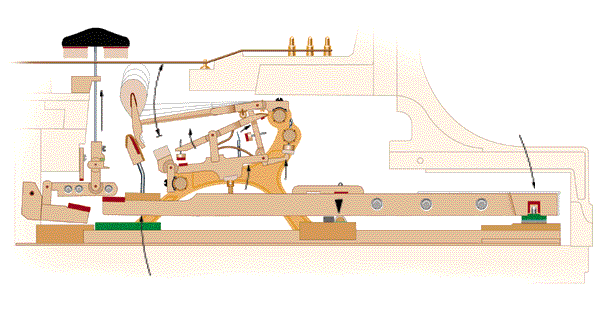
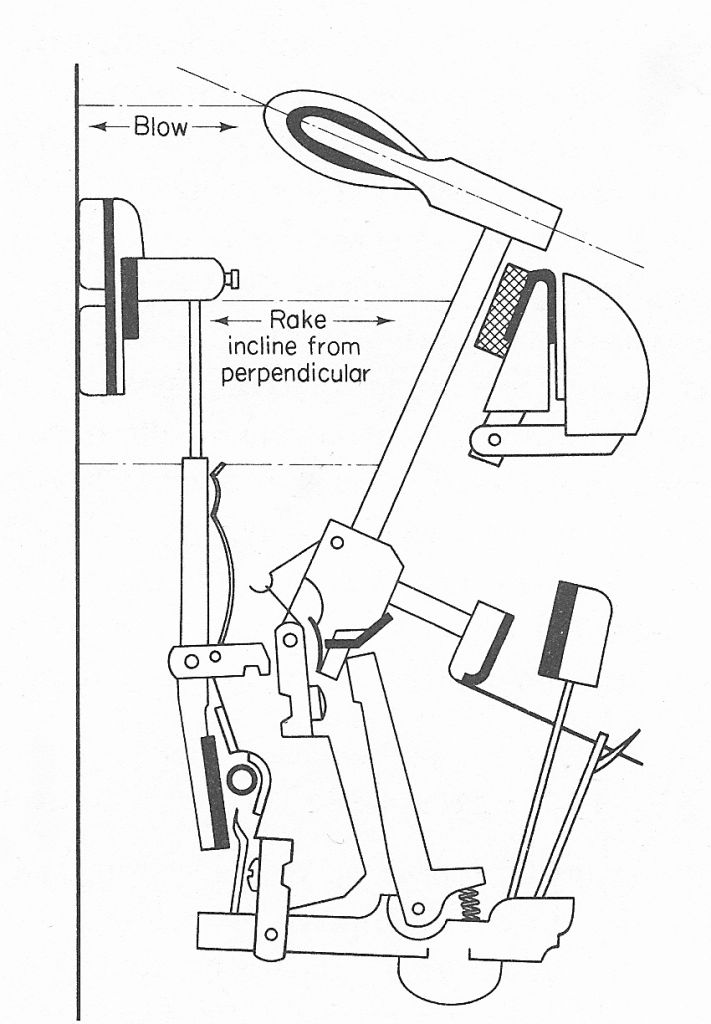









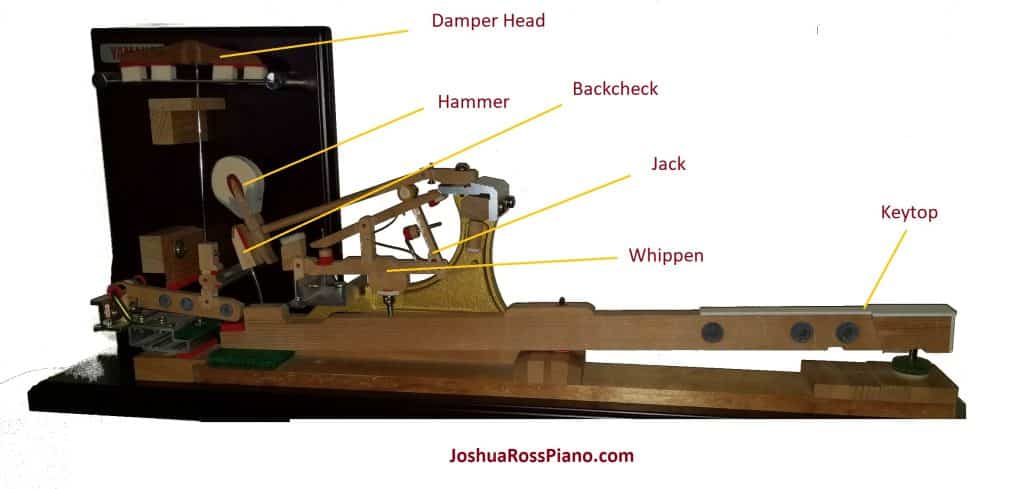

Comments
Post a Comment